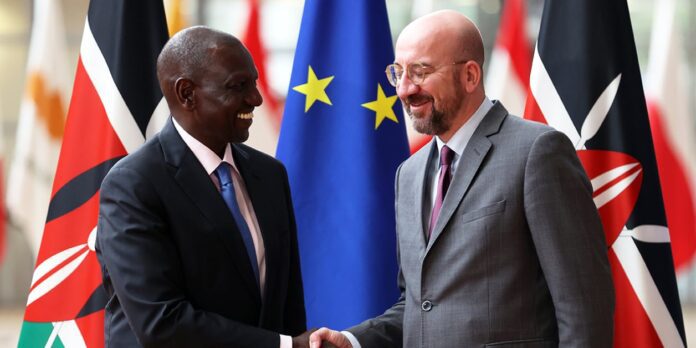Criticized by Congolese public opinion, in trouble with the DRC Armed Forces (FARDC) and part of the delegation's Felix TshisekediThe East African Community Regional Force (EACRF) continues, however, to strengthen its presence in North Kivu, with the arrival of the first contingents from Uganda and South Sudan in early April.
Still enhanced in areas where the M23 began to withdraw, the EACRF faced a problem affected since its creation in June 2022: that of financing its military operations.
William Ruto's lobby
According to the statutes of this force – adopted for six months in September 2022 and pending resumption – countries must finance the intervention of their contingents themselves. But member states, which are sending troops to eastern DRC, have been seeking funds to support their operations. AND Guilherme Rutois, without a doubt, the one who for shows what is most proactive in this area.
The first country to station its troops in Goma, Kenya plays a leading role in the regional force. The command of the EACRF is also assured by the Kenyan generalJeff Nyagah. Coming to power in September 2022, William Ruto initially appeared hesitant to get involved in the Nairobi process, driven by his predecessor, Uhuru Kenyattaand was reluctant to strengthen his forces against the M23.
He had finally formalized the arrival of his soldiers on November 2, after having exchanged with several of his counterparts, including the French president Emmanuel Macron, who then mentioned his willingness to request, in Brussels, financing from the European Peace Facility (EFF) for the deployment in Kenya. Although no formal application was made, this issue was raised during William Ruto's visit to Brussels on 29 March. The Kenyan Head of State met in particular with the President of the European Council, Charles Michelwith whom he discussed the eastern DRC archive and the future of the EACRF.
A week before that meeting, Nairobi had contacted Brussels to clarify its ambitions. On March 22, Kenya's Foreign Minister, Alfred Mutua, enviously wrote a letter to the High Representative of the European Union (EU) for Foreign Affairs, the diplomat Joseph Borrellin order to formulate a “request for support for the Kenyan deployment” in eastern DRC.
113.2 million euros
This letter, which JA was able to consult, did not provide any details on the potential duration of operations in Kenya, nor on the exact amount requested from the EU. However, it is accompanied by a summary table of “EACRF operations and logistical support requirements” that gives an overview of the budget foreseen for the interventions. to do Contingents from Kenya, Burundi and South Sudan – Uganda's needs, on the other hand, are not mentioned.
For the actions of 904 Kenyan soldiers to join the regional force, the document has a total amount of 113.2 million euros. A significant sum – far from the 37 million euros anticipated by the Kenyan Ministry of Defense for the first six months of occupation of its men – which is expected to cover several areas ranging from logistical needs (such as rations, medical equipment or water storage) to military equipment.
For the implementation of an aerial surveillance device, a value of 1.15 million euros is specified. The envelope for purchasing small arms is valued at 4 million euros, while 30.2 million euros are allocated to “combat support vehicles”. By way of comparison, the needs of the 300 South Sudanese soldiers are valued, in the same table, at 40.1 million euros, and those of the 900 members of the Burundian army, at 107.1 million euros.
Disorganization
Will this request from Kenya enable the release of funds? In the case of Nairobi, the preferred tool would be the European Peace Facility. Created in March 2021, this mechanism allows financing different aspects of military support to a third country, including lethal weapons. At the end of November, 20 million euros were released by the EU to support the Rwandan deployment in Mozambique.
But prompted with the overwhelming majority of EFF funds now going to Ukraine, other EU member states will still have to be enticed into providing support. A process that can take many months. For now, the attraction of member countries, which have remained in the informal phase, comes up against the reluctance of some partners, who point to the disorganization of the participants and the EAC secretariat – each requesting its own financing –, as well as the contours vacancies in the mandate of there strength.

